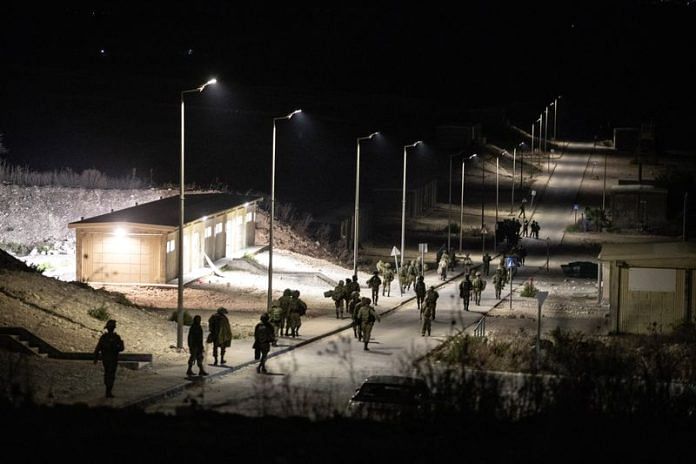By Artorn Pookasook and Maya Gebeily
JERUSALEM/DUBAI (Reuters) -Israel expanded its targets in its war with the Iran-backed Hezbollah in Lebanon on Monday, killing at least 18 people in its first strike on the Christian-majority town of Aitou in the north, the Lebanese Red Cross said.
So far the main focus of Israel’s military operations in Lebanon has been in the south, the eastern Bekaa Valley and the suburbs of Beirut.
The strike in the northern region hit a house that had been rented to displaced families, Aitou Mayor Joseph Trad told Reuters. In addition to the deaths, four people were injured, the Red Cross said.
Israel on Monday ordered residents of 25 villages to evacuate to areas north of the Awali River, which flows through southern Lebanon, as it intensifies its attacks in the region.
An Israeli strike killed Muhammad Kamel Naim, the commander of the anti-tank missile unit of Hezbollah’s elite Radwan Force, in the Nabatieh area of south Lebanon, the military said.
Hezbollah has not immediately commented.
The operations come amidst high tensions between Israel and the U.N. peacekeeping force UNIFIL in south Lebanon, with Israeli Energy Minister Eli Cohen on Monday repeating a call by Prime Minister Benjamin Netanyahu for the U.N. troops to leave.
Israel and the United Nations have been trading accusations over the peacekeepers in south Lebanon, as Israel keeps pushing its forces through the area in an attempt to wipe out Iran-backed Hezbollah and its military infrastructure while it battles Hamas in Gaza.
The U.N. said Israeli tanks had burst into its base on Sunday, the latest allegations of Israeli violations against peacekeeping forces, that have been condemned by Hezbollah and by Israel’s allies.
Israel disputed the U.N. account and Israeli Prime Minister Benjamin Netanyahu called for the peacekeepers to withdraw, saying they were providing “human shields” for Hezbollah during an upsurge in hostilities.
Hezbollah denies it uses the proximity of peacekeepers for protection.
The Middle East, meanwhile, remains on high alert for Israel to retaliate against Iran for an Oct. 1 barrage of long-range missiles launched in response to Israel’s assaults on Lebanon.
The Pentagon said on Sunday it would send U.S. troops to Israel along with an advanced U.S. anti-missile system, as Israel weighs its expected retaliation against Iran.
The Israeli military took foreign journalists into southern Lebanon on Sunday and showed them a Hezbollah tunnel shaft that was less than 200 metres away (650 feet) from a UNIFIL position, as well as weapon stashes that the troops found.
Brigadier General Yiftach Norkin said the tunnels were built a few years ago.
“We are actually standing in a military base of Hezbollah very close to the to the U.N.,” Norkin said, pointing to the shaft’s trap door in an area covered by undergrowth and overlooked by a U.N. observation post.
Since announcing its ground operation near the border, the Israeli military says that it has destroyed dozens of Hezbollah tunnel shafts, rocket launchers and command posts.
“We found several days ago a huge quantity of weapons originally coming from Iran and Russia. Brand new,” said Colonel Olivier Rafowicz. “They were prepared for attacking us and (launching) a large invasion into the north of Israel,” Rafowicz said, showing the journalists crates of weapons.
Reuters could not immediately verify these claims.
EXTENSIVE TUNNEL NETWORK
Hezbollah possesses an extensive tunnel network in southern Lebanon, both the group and Israel say. Israel estimates they extend for hundreds of kilometres. A Hezbollah field commander told Reuters last week that the tunnels “are the foundation of the battle.” Hezbollah has not immediately commented.
UNIFIL has said previous Israeli attacks on a watchtower, cameras, communications equipment and lighting had limited its monitoring abilities. U.N. sources say they fear any violations of international law in the conflict will be impossible to monitor.
The European Union’s member states have taken too long to condemn Israel’s attacks on UNIFIL soldiers in Lebanon, the European Union’s foreign policy chief Josep Borrell said on Monday, describing the attacks as “completely unacceptable”.
EU countries, led by Italy, France and Spain, have thousands of troops in the 10,000-strong peacekeeping mission in southern Lebanon, which has said it has repeatedly come under attack from Israeli forces in recent days
On Monday, Spanish Prime Minister Pedro Sanchez urged European Union members to respond to a request by Madrid and Ireland to suspend the bloc’s free trade agreement with Israel over its attacks in Lebanon and Gaza.
The conflict between Israel and Hezbollah resumed a year ago when the militant group began firing rockets at Israeli positions in support of Hamas at the start of the Gaza war and has sharply escalated in recent weeks.
Israel says its operations in Lebanon are aimed at securing the return of tens of thousands of its residents displaced from their homes in northern Israel.
(Additional reporting byy Maya Gebeily; Writing by Michael Georgy; Editing by Stephen Coates, Toby Chopra and Sharon Singleton)
Disclaimer: This report is auto generated from the Reuters news service. ThePrint holds no responsibilty for its content.



